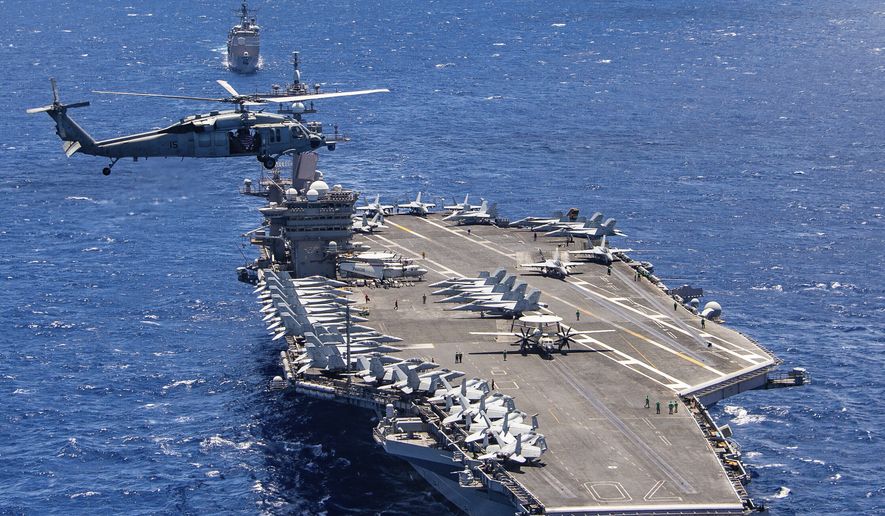Two Navy aircraft carrier strike groups are conducting operations in the disputed South China Sea amid heightened tensions over recent Chinese aerial incursions near Taiwan.
The Navy announced Tuesday that the carrier groups led by the USS Carl Vinson and USS Abraham Lincoln are together practicing communications, anti-submarine warfare and air warfare drills and maritime interdiction operations in the strategic waterway that carries much of the world’s maritime commerce.
The operations seek “to strengthen maritime integrated-at-sea operations and combat readiness,” the Navy said in a statement, adding that the training is being carried out in international waters and is legal under international law.
The carrier deployment follows China’s dispatch on Sunday and Monday of 52 warplanes, including H-6 bombers and strike aircraft, near southern Taiwan on Sunday and Monday. The warplane incursions were first reported on the Taiwan Defense Ministry website that news reports from the island say was shut down in an apparent cyberattack on Tuesday.
The carrier exercises involve over 14,000 sailors and Marines demonstrating what officials said was the Pacific fleet’s “ability to deliver a powerful maritime force.”
Earlier, the carriers conducted operations with the Japanese military in the Philippine Sea east of Taiwan.
During operations Tuesday, an F-35C jet crashed during a landing on the deck of the Vinson during flight operations. The pilot ejected safely and was rescued by a Navy helicopter. The pilot is in stable condition, the Navy said.
A total of seven sailors were injured in the mishap, with three requiring medical evacuation to Manila, Philippines. Four were treated aboard the ship and three released. The mishap is under investigation, the Navy said.
The F-35 is the military’s most advanced fighter-bomber and the loss of the aircraft in the South China Sea is expected to prompt Navy recovery efforts to prevent its stealth and other high-technology from falling into Chinese hands.
Chinese state media quickly seized on the incident, arguing that the F-35 mishap “exposed the exhaustion of the U.S. military” that has been trying to contain China across East Asia. The Chinese Communist Party outlet Global Times noted the accident followed the collision of a Navy Seawolf-class attack submarine with an underwater object in the South China Sea several months ago.
Despite the accident, the mission of the carriers and accompanying warships provides valuable training, said Rear Adm. J.T. Anderson, commander of the Lincoln strike group.
“Operations like these allow us to improve our combat credible capability, reassure our allies and partners, and demonstrate our resolve as a Navy to ensure regional stability and counter malign influence,” Adm. Anderson said.
Rear Adm. Dan Martin, commander of the Vinson naval group, said the two carriers show the capability of delivering “overwhelming maritime force, when called upon, to support a free and open Indo-Pacific region.”
China has stepped up naval activities in the South China Sea and has claimed sovereignty over 90% of the sea under what it calls the “Nine-Dash Line” covering most of the waterway. An international tribunal rejected the Chinese maritime claims and that has been the basis of regular U.S. and allied naval patrols and exercises in the sea.
Stepped-up military activities in Asian waters come as tensions remain high in eastern Europe as Russia and NATO joust over a possible Russian invasion of Ukraine.
At the Chinese Foreign Ministry, spokesman Zhao Lijian denied reports that Chinese President Xi Jinping had sought to discourage Russian President Vladimir Putin from launching an attack on Ukraine while Beijing is hosting the Winter Olympics next month.
The report “seeks not only to smear and drive a wedge in China-Russia relations but also to deliberately disrupt and undermine the Beijing Winter Olympics,” Mr. Zhao told reporters. “Such a despicable trick cannot fool the international community.”
• Bill Gertz can be reached at bgertz@washingtontimes.com.




Please read our comment policy before commenting.